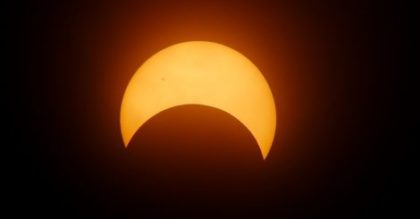
On Monday, I found myself swept along by the solar eclipse enthusiasm without really meaning to be. I didn’t travel, content with the 80% or so of an eclipse experienced in the Pittsburgh area where I live. I didn’t buy any special viewing equipment–not because I doubted the risks, but because I figured I’d use a pinhole viewer if I watched at all. And yet when the moment arrived, I found myself outside with a small group from the office building where I work, sharing a pair of special glasses graciously offered by a coworker. It was an interesting moment of shared curiosity, both with the folks standing with me and the wider public watching and talking about it online.
The moment was also a triumph of human scientific prowess. We understand the movements of the heavens sufficiently to be able to predict an eclipse decades in advance. We know enough about physics and biology to appreciate the risk of looking directly at the sun, and have the technological wherewithal to make special viewing devices to mitigate and control that risk. And so we claim victory of science over superstition. If we no longer need to invoke deities to explain why the sky goes dark, or to appease them in order to bring back the light, then we maybe we wonder if we can do away with them altogether.
Obviously I don’t think eclipse prediction means we don’t need God. We understand the mechanism of gravity and periodic orbits; we can still consider the purpose. Specifically, we can infer that the eclipse is not about us, at least not exclusively. It is not a punishment or an omen; the moon was going to pass between the earth and the sun on Monday no matter who was being naughty and who was being nice, and it was going to keep going out of that alignment a few minutes later. There is Biblical precedent for this idea as well. While certain miraculous events are expressly for the benefit of individuals and/or the kingdom of God collectively, other phenomena are attributed to the regularities of creation rather than a response to human activity. The blindness of the man healed in John 9 is expressly not a punishment for his or his parents’ sin. 1 Kings 19 describes a powerful wind, an earthquake and a fire in order to explicitly deny that they were connected to God’s communication with Elijah. And when Job is wondering why he is suffering, God’s response suggests to me a reminder that there is more going on in creation than just what involves us specifically.
Consequently, I get a bit wary of claims that solar eclipses are evidence of the universe being fine-tuned just for us. It is true that the relative size and distance of the sun and moon are conveniently matched so that the moon can just barely obscure the sun while leaving a visually stunning ring of light. Fiddle with those relative sizes and distances and you get either a completely obscured sun or an underwhelming partial blockage. Now, clearly eclipses inspire a certain amount of curiosity, excitement, and awe and so I don’t want to completely rule out the possibility that God was pleased to provide us such an aesthetically satisfying experience. At the same time, do we really want to go back to making eclipses about us? I’m not confident that we know enough about the alternatives to assert that the eclipse-friendliness of our planet would have worked out differently had God not specifically arranged it this way, or that we aren’t missing out on other aesthetically pleasing experiences only available on other planets.
I do appreciate the desire to provide as much evidence for God as possible. At the same time, we should be humble about our place in the cosmos. For me, it is enough that when our sin blocked out our view of God, the Son intervened on our behalf to restore our relationship. In that act, God demonstrated just how significant each and every one of us is to him. I’m happy to enjoy all of the interesting features of his creation without wondering if they are just for me or not.
In Finding God in the Waves, Mike McHargue describes how his own experience with creation led him back to God. Would you be interested in a blog book discussion of it? Have other suggestions?
Andy has worn many hats in his life. He knows this is a dreadfully clichéd notion, but since it is also literally true he uses it anyway. Among his current metaphorical hats: husband of one wife, father of two teenagers, reader of science fiction and science fact, enthusiast of contemporary symphonic music, and chief science officer. Previous metaphorical hats include: comp bio postdoc, molecular biology grad student, InterVarsity chapter president (that one came with a literal hat), music store clerk, house painter, and mosquito trapper. Among his more unique literal hats: British bobby, captain’s hats (of varying levels of authenticity) of several specific vessels, a deerstalker from 221B Baker St, and a railroad engineer’s cap. His monthly Science in Review is drawn from his weekly Science Corner posts — Wednesdays, 8am (Eastern) on the Emerging Scholars Network Blog. His book Faith across the Multiverse is available from Hendrickson.

Leave a Reply